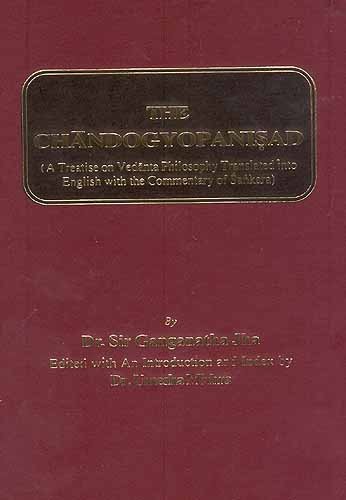Chandogya Upanishad (Shankara Bhashya)
by Ganganatha Jha | 1942 | 149,749 words | ISBN-10: 8170842840 | ISBN-13: 9788170842842
This is the English translation of the Chandogya Upanishad, an ancient philosophical text originally written in Sanksrit and dating to at least the 8th century BCE. Having eight chapters (adhyayas) and many sub-sections (khandas), this text is counted among the largest of it's kind. The Chandogya Upanishad, being connected to the Samaveda, represen...
Section 7.14 (fourteenth khaṇḍa) (two texts)
Upaniṣad text:
‘Hope indeed is greater than Memory. Fired by hope, Memory reads the Mantras, performs rites, desires sons, desires cattle, desires this world and also that world.—Meditate upon Hope.’—(1)
Commentary (Śaṅkara Bhāṣya):
‘Hope indeed is greater than Memory’—‘Āśā’ stands for the desire for things one has not got; they speak of it by several synonyms, such as ‘Hope’, ‘Longing’, ‘Desire’;—this is greater than Memory;—in what way?—It is when there is Hope in the mind that one remembers what he has to remember; it is only when one remembers the object hoped for that he is to ‘remember things; hence, when one is fired by Hope,— encouraged by Hope—that one remembers things and reads the Mantras—Ṛk and the rest,—and having read them, he learns their meaning from Brāhmaṇas, as also learning from them injunctions bearing upon the rites, he performs these rites,—with a view to the results accruing from them,—and desires sons and cattle,—as results following from the rites;—it is through Hope that he performs what are likely to accomplish those results,—and he desires this world—in order to secure—acquire things,—and desires that other world only when he is fired by Hope, and then he performs what is likely to secure it.
Thus, it is found that for each living-being the whole world is ope cycle consisting of Memory, Āśā and other things ending with Name, all bed up by the rope of Hope. Hence, Hope is greater than Memory; and therefore, meditate upon Hope,—(1)
Upaniṣad text:
‘One who meditates upon Hope as Brahman, by Hope do all his wishes prosper, his prayers become infallible; and he is free to act as he wishes in the sphere within reach of Hope;—one who meditates upon Hope as Brahman.’—‘Revered sir, is there anything greater than Hope?’—‘Certainly, there is something greater than Hope.’—‘Explain that to me, Revered sir.’—(2)
Commentary (Śaṅkara Bhāṣya):
One who meditates upon Hope as Brahman,—listen to the reward that accrues to him—when Hope becomes constantly meditated upon, all the wishes— of the meditators —prosper—attain fulfilment;—his prayers become infallible—all his prayers become fruitful; that is, whatever he prays for, he surely gets.—Within reach of Hope etc., etc.,—as before.—(2)
End of Section (14) of Discourse VII.
